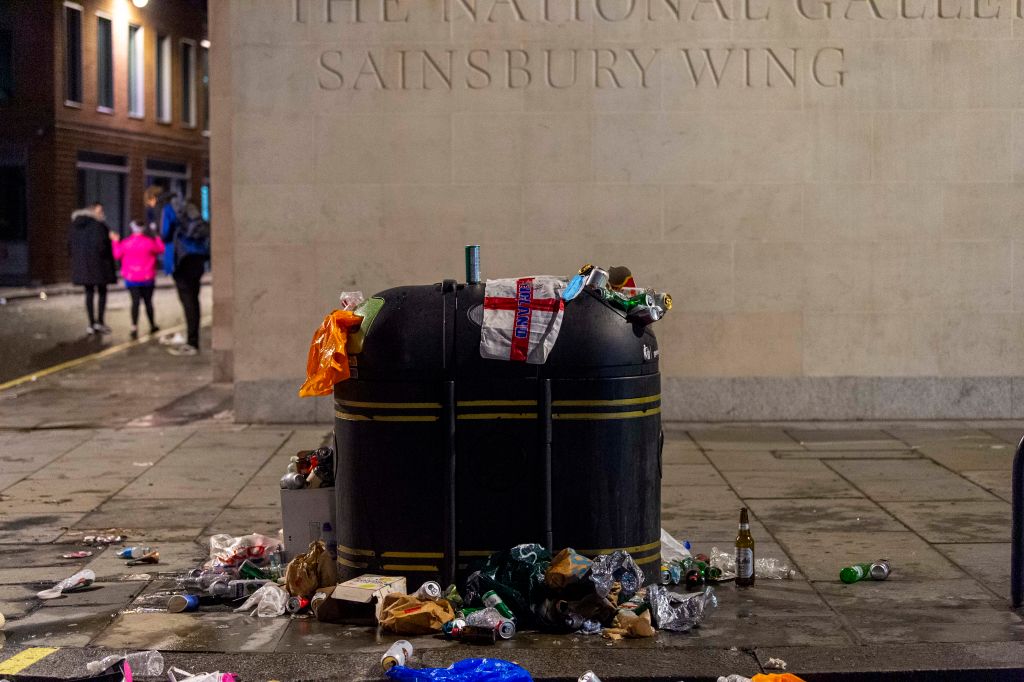The new Premier League season has begun and I don’t know what to think. I tried to watch all of England’s Euro 2020 matches, but I never made it to the end of any of them. When the final against Italy kicked off, I retired to a quiet room feeling angst and confusion. Why was I so out of step with everyone else?
Gareth Southgate’s players seem like lovely boys. And while they probably represent the better aspects of our evolving culture, it seems likely we may soon discover that they remain fallible. But if the response of the public to England’s triumphs and tragedy was one thing, the reaction of the media was quite another. It drew out the very worst reverse snobbery in me. Put simply, the more people who like football who didn’t used to like football, the less I like football. Yes, that’s childish and self-defeating. But I can’t help it.
The worst were comment writers who had never watched a football game before. Suddenly they were obsessing over working-class sportsmen. They did so in the hope that their own privilege could be assuaged by the promise of a more tolerant society. Behind them came the Corbynite leftovers, who had their own damascene conversion on the misguided premise that Marcus Rashford and his fellow players were unwitting Marxists.
Many supporters have found their own way to navigate around football’s alienating excesses and they still love the cause, even if they hate what the game has become
What was so infuriating about this reaction was the crass, unconscious condescension. These writers were saying ‘Now we’ve decided it’s OK to like the England football team and we’ve allowed ourselves to feel patriotic, then you lot have our permission to be patriotic too.’ And they wonder why Brexit happened.
Don’t get me wrong, I tried to ingratiate myself with the metropolitan liberal elite for years. I even got a job at the Guardian, where I worked on the sports desk. For the management at the time, the section was a bit like the bin men: necessary but mysteriously quotidian. But they never really took to me, although they did pinch some of my ideas. As a middle-aged balding man from Essex, I like to think it was because they were threatened by my proletarian intellect. The truth is that it was probably because I didn’t have a second home.
Working on the production team of a national sports desk means you watch football every day. If it sounds like a dream job, the reality was different. By the time I left after ten years, any residual interest had been conditioned out of me. I didn’t really fit in there, but then I don’t fit in among my own people either. This is a product of a very specific liminal existence confined to less well-heeled suburbs and satellite towns: I have always lived between classes, between locations and between cultures.
Perhaps the rot had set in earlier. When I watched my team Arsenal secure the double at the 1998 FA Cup final, I knew I was taking how good they were for granted. Even then, it was already obvious that the team’s homegrown or local talent was thinning out. I had been raised on a lineage from Pat Rice, David Rocastle and Tony Adams, through to Ian Wright. Yet the identity of my team – and almost every big team – dissipated with each passing season during the noughties.
Many supporters have found their own way to navigate around football’s alienating excesses and they still love the cause, even if they hate what the game has become. The gentrification of football has been written about for almost 30 years, but it was more than that – the slow demise of my interest has been a symptom of something more profound and unsettling.
I feel pretty lucky to be English (or British, it doesn’t much matter to me). And I don’t think there’s anything wrong with patriotism. But football is so often tied to belonging (just ask a Liverpool supporter) and to masculinity too. Despite all that’s changed in football and the culture beyond, men still gather to watch it, tribally for their clubs and as a confederacy for England. It may seem England’s footballers have transcended toxic masculinity as well as the other ‘Olds’ of this cultural revolution, but please be assured the vast majority of England’s young men have not. I can’t disentangle these things from each other. I don’t belong with the old supporters but can’t bear the new ones. I drifted away; now football feels like it belongs to a previous life.
It’s as if the more identity becomes the currency by which we barter our existence, the less I feel I have an identity at all. God knows I’m not looking for sympathy. If my identity is vaporous, then that is the luxury of a white middle-aged man.
Listening to football on the radio is still a pleasure, if only as familiar ambience. All summer long I’ve been told the England football team embodies a new version of England we can all be proud of. But what does this mean if football and patriotism have no say in defining who you are? It’s even weirder when so many of those making that claim are converts (the polite term) or parvenues (the uncharitable one) – people who have spent a lifetime scoffing at the game and the flag waving that accompanies it.
Now even football is about identity politics I am left doubly confused, since I’ve lost my love of football and I have no identity. Everyone is getting in on the act except me. One day football will come home. I’m not sure I ever will.






Comments